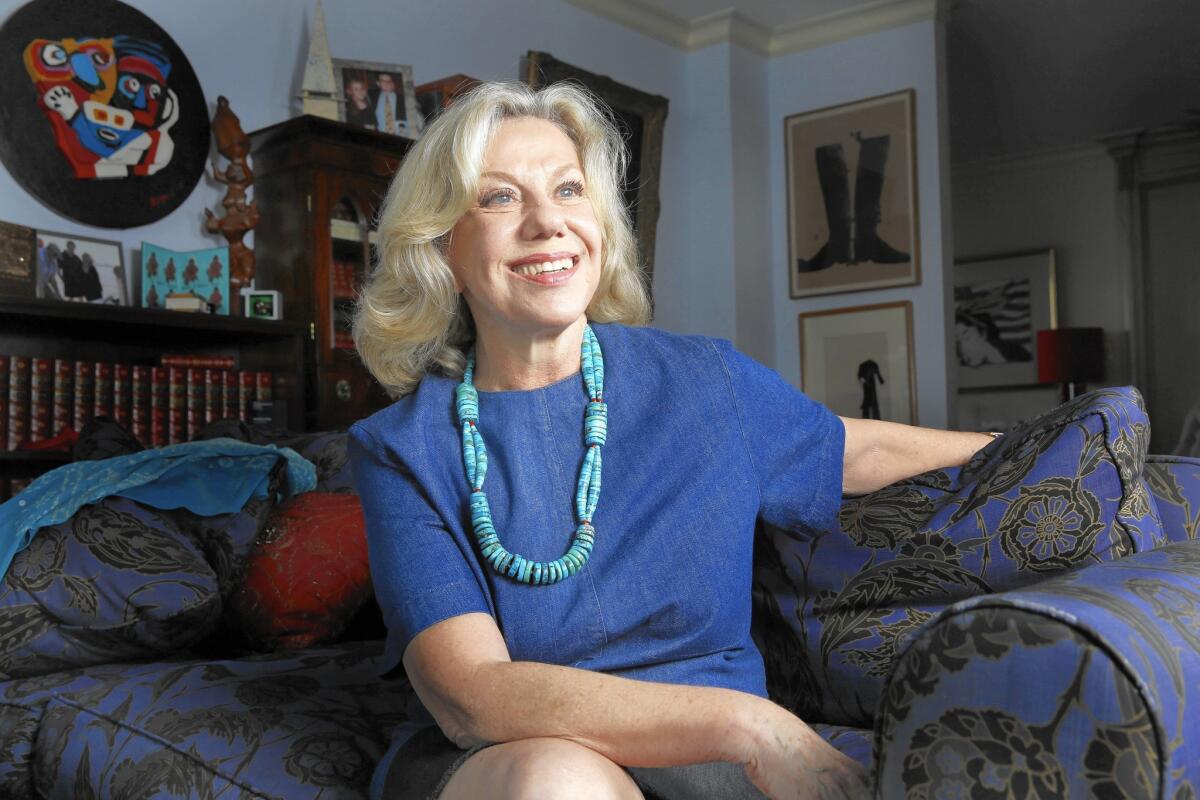Why Erica Jong decided to take on mortality in ‘Fear of Dying’

- Share via
More than four decades have passed since Isadora Wing fantasized in “Fear of Flying” about zipless adventures, spotlighting women’s sexuality and helping to further the sexual revolution. And her prolific creator — novelist, poet and feminist Erica Jong — has other things on her mind these days, as evidenced by her new novel, “Fear of Dying.” Jong’s latest work of fiction follows her 60-year-old protagonist, Vanessa Wonderman, as she navigates the way stations of her parents’ deaths, her grandchild’s birth and late-in-life sexuality. Jong talked about the book by phone from her home on New York’s Upper East Side.
When did you start thinking about mortality a lot?
I always thought about it. The only subjects of poetry are love and death. If you think like a poet, you always think of mortality. As somebody who loved Keats, I was very aware of mortality, but I think as a novelist, I started to be really aware as my parents were failing, and I used some of that material about my own parents, although Vanessa’s parents are not exactly my parents. But you see them weakening and weakening and weakening. So that’s really a life-changing moment.
Does your personal experience have anything to do with the 10-year gap between novels?
Absolutely. Partly it was because my father was dying and I was very, very close to him. And my mother was dying, although she lived much longer than my father — my father died at 93, she died at 101 — and my daughter had three children in that period. So life interrupted. And I wanted very much to be near my grandchildren and be there for [daughter] Molly [Jong-Fast], who’s an only child, and she and I are very close.
The other reason was I couldn’t find a voice for the book. Everybody wanted me to write the last Isadora book, and Isadora just had too much baggage. And it was only when I was almost finished with the book that I introduced her as a minor character who was best friends with my major character.
In the book, you rail against writers being typecast, but doesn’t the title invite typecasting?
The working title of the book was “Happily Married Woman.” And the first chapter was called “Fear of Dying.” Around the time I submitted the book, I changed the title to “Happily Married Woman: Fear of Dying” because I realized that a theme that went through the book was mortality — becoming very aware of your mortality when your parents are failing, having a husband who nearly dies, having a daughter giving birth. And it was only when my publisher said we love this title that it became the main title.
There are sex scenes, so people who typecast you will not be disappointed.
I think the sex scenes are comical for the most part. At the end of the book, there is a kind of love story that emerges. But Isadora comes into the picture and says, “Look, you’re not looking for sex, you’re looking for connection.” And Vanessa realizes that she’s very connected to [her husband] Asher, and that they’re very close and that all these crazy men with fetishes are not going to satisfy the longing for connection.
Vanessa says, “I had needed sex so much, I didn’t realize it was different from love.” And also, “we make sense mean more than it should.” Is that a critique of your early work?
I don’t think so.... I was never into casual sex. I always had long-term relationships that were pretty monogamous until things fell apart. I think people made me the advocate of casual sex, but I really wasn’t in my own life.
Your character raises the question of whether it’s possible to feel passion at any age. What are your thoughts on that?
I don’t think people realize that sexuality is present throughout our lives. It may not be exactly as it was when we were younger, but we have this longing to connect with our bodies as well as our minds. And I think people would be so much happier if they realized it’s not always the same form, but it continues through our lives.
Nonetheless, I don’t think there’s that much literature out there about 60-year-old women wanting sex.
I think that’s important, actually. I remember a clever editor once said to me, “There’s never been a bestseller about a woman over 40,” and I said, “Well then, we’ve got to write it.”
Vanessa also says, “How did my generation get feminism so wrong?” Do you think you had it wrong?
No, I think my feminism was very humanistic. In fact I was considered a bad feminist long before Roxane Gay used the term because I used to say you can’t tell women they can’t be close to their fathers, their brothers, their lovers. It wasn’t popular in the ‘70s. Now younger feminists think I was prescient, but I don’t think you can just throw out men completely. We may not have to marry them. We may not have to submerge ourselves in them, but I like them. They’re interesting and they’re different from us. I don’t think they should dominate society. In fact, I really feel that women, as in Native American cultures, should be the deciders of war and peace. I really believe in grandmother power.
More to Read
Sign up for our Book Club newsletter
Get the latest news, events and more from the Los Angeles Times Book Club, and help us get L.A. reading and talking.
You may occasionally receive promotional content from the Los Angeles Times.










